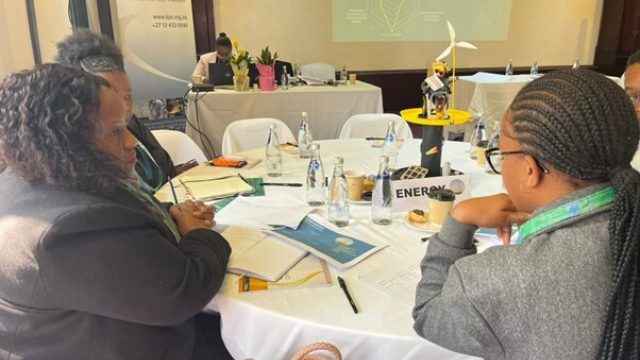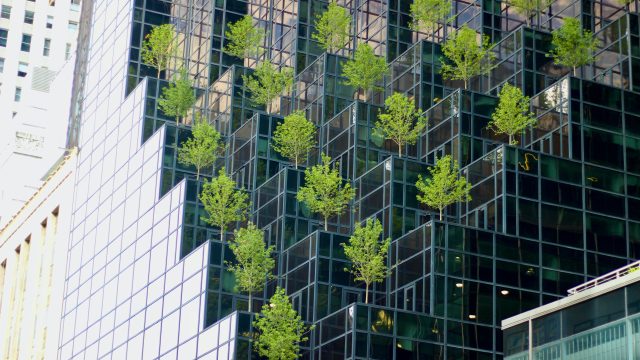After the storm: South Africa's green economy future
To mark Nelson Mandela Day, we explore the ramifications of the 2024 general election for the green economy in the Rainbow Nation.

The 2024 South African general election marked a pivotal moment for the Rainbow Nation's approach to climate, energy, and equality policies. This Nelson Mandela Day, Elize Hattingh, a Sustainability Specialist based in Cape Town, explores the ramifications for the green economy in the Rainbow Nation.
At the end of May 2024, voters in South Africa delivered a seismic shock, denying the ruling African National Congress (ANC) party a majority for the first time since the end of apartheid some 30 years ago. Forced into a coalition government for the first time in its existence, will the ANC ramp up ambition on climate, energy and social progress to win back voters?
Although the ANC's manifesto reiterated a commitment to net-zero emissions and adaptation plans, the need for a coalition to maintain governance introduces uncertainties regarding the implementation of these policies.
The energy sector, in particular, faces a critical juncture. South Africa's ongoing power crisis, exacerbated by aging coal power plants and marked by frequent and severe load-shedding, has underscored the urgency of addressing energy stability. Eskom, the national power utility, struggles with inadequate infrastructure, financial woes, and corruption. This has led to a national debate on the pace and scope of transitioning to renewable energy, which some fear could exacerbate current issues if not managed carefully.
Despite the slow pace of change, there have been notable advancements in renewable energy projects. There has been a boom in rooftop solar installations among those who can afford it, signalling a grassroots shift towards renewable energy. A new 10% import tariff on Solar PV is securing local manufacturing opportunities and drives job creation (green jobs). The introduction of the Just Energy Transition Investment Plan (JET IP) aims to secure substantial funding for moving away from coal while supporting affected workers and communities. Recent investments in solar and wind energy projects signal a shift, albeit gradual, towards greener energy.
“ Will the new Coalition Government shape a new pathway for South Africa and require political leaders to put the country above party, compromise, and adhere to democratic principles?”
On the climate front, South Africa's position as the 14th largest emitter of greenhouse gases globally underscores the importance of effective climate policies. The approval of the Climate Change Bill by the National Assembly represents a significant legislative effort to formalise emission reduction targets and enhance climate resilience. This bill is part of a broader strategy that includes the South African Renewable Energy Masterplan (SAREM), aiming to develop value chains for renewable energy technologies and create jobs.
The election results reflect growing public dissatisfaction with energy instability, declining social trust in government, and ongoing economic challenges. Political parties are leveraging energy policies to gain voter support, with some advocating for rapid renewable energy adoption and others cautioning against abandoning coal too quickly. This political dynamic will significantly influence the country's energy policy direction post-2024.

The introduction of independent candidates and the performance of new parties like uMkhonto we Sizwe (MK) reflect a changing political landscape that could reshape the discourse on gender-based violence (GBV) and gender equality. The uncertain political climate has already impacted financial markets, with the rand and equity indices experiencing declines. This economic uncertainty could influence the government's capacity to fund and implement robust climate, energy, and equality policies.
Conclusion: looking ahead
The Government of National Unity (GNU) cabinet, a coalition government that includes representatives from multiple political parties aims to ensure broader representation and stability in the country's governance. This evolving coalition landscape is facing a number of complexities and challenges of governing in a multiparty democracy, with ongoing implications for political stability, governance effectiveness, and service delivery. However, light is visible at the end of the tunnel – a new Coalition Government will shape a new pathway for South Africa and encourage more inclusive governance practices and will require political leaders to put the country above party, compromise, and adhere to democratic principles—prioritising climate change challenges and committing to renewable energy.
- Elize Hattingh, sustainability researcher, Cape Town
References:
Theuns Eloff, “From Deadlock to Democracy: Lessons from CODESA for Future Coalitions,” Analysis, News 24, June 1, 2024.
Murmur and Centre for Analytics and Behaviour Change, “Tracking Russian Influence into the Online South African Political Discourse,” Daily Maverick,” May 28, 2024.
Pumzile Van Damme, “Disinformation, Governance and the South African Election,” ISS African Futures, March 24, 2024.
Africa Center for Strategic Studies, “Mapping a Surge of Disinformation in Africa,” Infographic, March 13, 2024.
Joseph Siegle and Candace Cook, “Africa’s 2024 Elections: Challenges and Opportunities to Regain Democratic Momentum,” Spotlight, January 17, 2024.
Paul Nantulya, “SADC Attempts to Navigate Zimbabwe’s Disputed Election,” Spotlight, Africa Center for Strategic Studies, October 11, 2023.
Paul Nantulya, “Lessons from South Africa for Holding Leaders Accountable,” Spotlight, Africa Center for Strategic Studies, April 18, 2023.
Thabo Leshilo, “ANC in Crisis: South Africa’s Governing Party is Fighting to Stay Relevant – 5 Essential Reads,”The Conversation, December 15, 2022.


